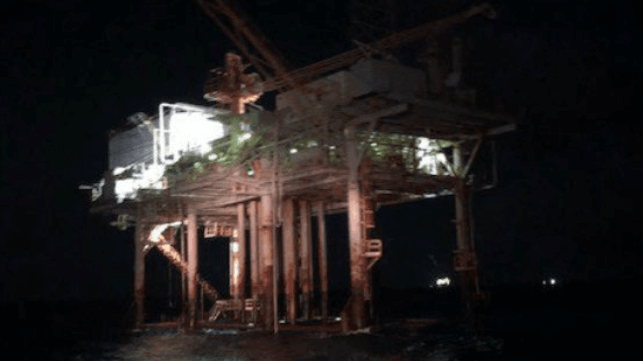Work & Rest Issues Contributed to OSV Platform Allision

Crewmember fatigue was the root cause of an allision between a small OSV and an offshore platform off the coast of Port Fourchon in 2021, according to the National Transportation Safety Board.
On June 24, 2021, the OSV Elliot Cheramie pulled into her berth at Port Fourchon to resupply, refuel and conduct a crew change for her master and her deckhand. The mate was on duty stowing boxes of supplies until about 1630, when he went to bed.
The Cheramie was chartered to provide regular supply service to Kinetica Energy's platform VR-397A, about 120 nm to the southwest of Port Fourchon. The vessel departed on her normal route at 2000, with the relief captain at the helm and five offshore platform workers on board. The relief deckhand - who had not been able to sleep before boarding - got to bed at 2130 to get some rest before his watch at 0000.
The mate woke at 2200, having had about five hours of sleep, and relieved the captain to take the 0000-1200 watch. The relief deckhand, who was scheduled to be on watch with the mate, slept through his alarm. His shipmate on the offgoing watch went to bed without waking him or being relieved. Meanwhile, the mate was alone on watch in the wheelhouse, the sole crewmember awake on board.
The mate had the OSV in autopilot, navigating at about 10 knots towards platform VR-397A. He felt more tired than usual, he told investigators, so he walked around the wheelhouse and bridgewings to keep alert. At some point, he sat in the wheelhouse chair, and he fell asleep. The vessel was not equipped with a BNWAS, so no alarms sounded. He woke up to see an unknown oil platform dead ahead, he said. He did not have time to maneuver or slow enough to avoid it, and the Elliot Cheramie struck the platform at 0245.
Everyone aboard the vessel awoke when the allision happened. The mate and the captain checked on their passengers, and four out of five reported minor injuries. The vessel was not taking on water, but the bow was holed and bent above the waterline.
At 0400 hours, the master ordered a return to Port Fourchon. He reported the accident to the Coast Guard half an hour later, at 0435, including the injuries to personnel and the damage to the vessel. The Cheramie was back at its berth in Port Fourchon at 1130.
The platform, identified as EI-259A, was shut in and unmanned at the time of the casualty. The operator inspected it on June 25 and found damage to two pipelines and some structures at the platform boat landing. No pollution was found, and the platform and lines were repaired at a cost of about $165,000.
The damage to the Cheramie was more costly: buckled bulwarks, torn plating, and a misaligned starboard engine cost $200,000 to fix.
Since the mate fell asleep on watch, NTSB honed in on hours of work and rest. Because of extra duties in port, the mate had been working for 19 hours the previous day, a violation of the company's SMS, and had had just five hours of sleep before his watch. Insufficient sleep is culturally accepted in some workboat environments, and while not technically illegal, it can contribute to fatigue, reduced alertness and drowsiness. The operating company's SMS included optional guidelines for managing fatigue, but NTSB found few hard rules.
"The extended work hours outside of the mate’s normal schedule reduced the opportunity to receive sufficient sleep," concluded NTSB. "A company SMS should be constructed such that companies and crews have clear policies and procedures to follow, and companies should provide sufficient resources to ensure safe operations and be compliant with those policies."
